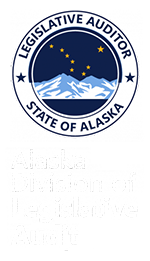| SUMMARY OF: | A special report on the Department of Revenue (DOR), Seafood Industry Tax and Assessment Revenues, May 19, 2011 |
Purpose of the Report
In accordance with Title 24 of the Alaska Statutes and a special request by the Legislative Budget and Audit Committee, we have conducted a performance audit on the DOR Tax Division’s completeness and accuracy of seafood related tax collections. Furthermore, we evaluated the Tax Division’s reconciliation of reported taxed values and volumes to state and federal reports of harvest as well as the Tax Division’s audit process.
Report Conclusions
DOR’s fisheries tax audits are too limited in scope to provide assurance that tax revenues are complete and accurate. Currently, fisheries-related tax audits are limited to Salmon Product Development (SPD) tax credits. There are no formal or established procedures in place for assessing risks in order to determine where to focus audit resources for fisheries tax programs or selecting taxpayers for audit. Additionally, there are no documented policies or procedures for auditing fisheries tax revenues other than those relating to the SPD tax credit.
Regulatory changes are needed to support DOR’s accurate and complete collection of fishery taxes. Specifically, regulations for enforcing the SPD tax credit have not yet been adopted.
The Commercial Operator’s Annual Reports can be a valuable tool in ensuring accurate tax payments for Fisheries Business Taxes. On a limited basis, reconciling reported taxed volumes or corresponding values of seafood harvest can be performed to verify components of the Fisheries Business Taxes. This could be an effective tool for identifying high risk taxpayers needing additional evaluations and potential audits.
Alternative price reporting information is not available to DOR for comparative purposes. DOR is not permitted to access confidential federal resource managers’ harvest reports. Federal laws governing programs administered by National Oceanic and Atmospheric Administration, National Marine Fisheries Service prohibits sharing confidential harvest data with outside agencies unless the data is specifically needed for resource management. With the exception of one city, fish taxes collected by local municipalities are not comparable as a tax base to the Fisheries Business Tax. Therefore, local community tax data is not an effective source of outside information for the State to verify reported taxed values and volumes. Furthermore, the data contained in the Alaska Salmon Price Report is not useful to the Tax Division in their mission to collect taxes. This is because the report collects information on wholesale and retail values of processed fish rather than unprocessed values which is the basis for state seafood taxes.
Taxpayer audits are necessary to verify that all year-end price adjustments or other bonuses paid to fishermen have been properly reported. Although it is possible to identify all bonus returns filed in a given year, this method would only capture bonuses paid after the original return is filed, thereby producing an incomplete record of actual bonuses paid. Furthermore, this method would not identify taxpayers who paid year-end bonuses, but did not report them to DOR.
Findings and Recommendations
1. DOR’s commissioner should diversify audits of fisheries-related tax revenues based on a risk assessment.
2. DOR’s commissioner should adopt regulations to enforce the Salmon Product Development tax credit.

